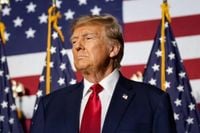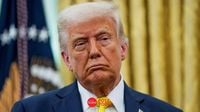Donald Trump is facing unprecedented disapproval regarding his economic management, as revealed by a recent survey conducted by CNBC. This survey indicates that his popularity has plummeted to the lowest levels recorded during his presidency, amidst widespread dissatisfaction with his handling of various economic issues including tariffs, inflation, and government spending.
According to the survey, which sampled 1,000 Americans nationwide from April 9 to April 13, 2025, only 44% of respondents approve of Trump's economic policies, while a significant 51% disapprove. This marks a notable shift from previous surveys, as it is the first time that Trump's economic approval ratings have turned negative while he remains in office.
Jay Campbell, a partner at Hart Associates, emphasized that Trump was elected with the expectation of improving the economy, yet the latest findings suggest that many Americans are dissatisfied with the current state of affairs. "Donald Trump was elected again to improve the economy, but so far, people are not liking what’s happening," Campbell stated.
The survey results reveal a stark contrast in perceptions between different political affiliations. Among Democrats, a staggering 90% disapprove of Trump's economic management, a figure significantly worse than the average disapproval ratings during his first term, which were about 30 points lower. Meanwhile, independent voters have also shown increasing discontent, with their disapproval ratings rising by 23 points compared to the first term.
Despite this, Trump's base of blue-collar workers, who were crucial to his electoral success in the past, still shows some support for his economic policies. However, even within this demographic, disapproval has risen by 14 points compared to the average during his first term.
In terms of specific economic issues, tariffs have emerged as a significant point of contention. The survey indicates that 49% of Americans view tariffs negatively, believing they adversely affect American workers, inflation, and the economy as a whole. The disapproval is especially pronounced among Democrats, with 83% opposing the tariffs, while independent voters disapprove by a margin of 26 points. In contrast, 59% of Republicans support the tariffs, although this figure is down from 79% in previous evaluations.
Furthermore, concerns about inflation have intensified, with 57% of respondents believing that an economic recession is imminent. This represents a substantial increase from 40% in March 2024, with an additional 12% believing that the recession has already begun. The public's dissatisfaction with federal spending management also reflects a negative sentiment, with a disapproval rating of 51% against a 45% approval rating.
Interestingly, Trump's handling of immigration remains one of the few areas where he garners positive feedback. His policies on border management and deporting illegal immigrants received approval from 53% of respondents, while 52% support the deportation of undocumented immigrants.
The stock market sentiment is also telling; 53% of Americans view this as a poor time to invest, a significant shift from the previous optimism that characterized Trump's election period in December 2024. The survey results suggest a rapid decline in market confidence, contrasting sharply with the initial surge following his election.
Despite Trump's declining approval ratings, the overall support for Democrats has not significantly increased. When asked about congressional preferences, 48% of respondents supported Democrats, while 46% backed Republicans, showing little change from previous surveys.
In summary, Trump's economic management is currently under fire, with a growing number of Americans expressing dissatisfaction across various demographics. The survey's findings underscore a critical moment for Trump as he navigates the complexities of economic policy amidst increasing public scrutiny and shifting sentiments.





